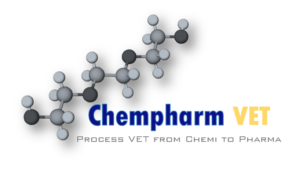 Erasmus+ NTI-MMM 2015-1-NO01-KA202-013278
Erasmus+ NTI-MMM 2015-1-NO01-KA202-013278
ChemPharmVET
Process oriented VET from Chemical industries to Pharmaceutical production 
Erasmus+ Strategic Partnership (2015-2017) NO, DE, PT, SI, SK
NTI-MMM: Multilateral Monitoring and Management (2015-1-NO01-KA202-013278)
Chemical and pharmaceutical industrial production employs millions of Europeans and offers all sorts of products, from plastics and metal alloys, to fertilizer, food and medical products for humans and animals. The European chemical industry is a €673 billion industry and the world’s top exporter and importer of chemicals, with a record €43.5 billion trade surplus in 2014.
As one of the largest and most diversified industries globally, the European chemical industry supplies virtually all sectors of the economy, providing innovative and sustainable solutions to today’s economic and environmental challenges. It plays a vital role in providing all manufacturing sectors. It has created wealth and employment for millions of European citizens over the years. In the EU it is the leading manufacturing sector in terms of value added per employee.
Access to process operators with relevant qualifications has been a growing problem. The shortage is due to different factors, including demographic change and a general lack of up-to-date training courses for those already working in the sector, and for young, potential recruits. To meet the challenges, the European Chemical Employers Group (ECEG) and the EMCEF (European Federation of Chemical and General Workers Unions) signed a European Framework Agreement on competence profiles for operators. The Agreement has contributed to the formulation of specific requirements regarding competencies operators must develop through vocational education and training.
The ChemPharmVET project was based on previous achievements towards key competences for operators in the chemical industry with the overall objective to develop innovation in vocational education and training.
The project was based on the units of learning outcomes developed in the PILE UP project with the target of developing curricula for the training of operators in the chemical and pharmaceutical industry on EQF level 4.
With the further development of the PILE UP project with units of learning outcomes tested by stakeholders around Europe, a new European model curriculum and training programmes for VET providers for the training of operators in the chemical and pharmaceutical industry was created.
The main project outcomes of ChemPharmVET are the development of:
- the Pile Up matrix extensions, including additional units of learning outcomes for operators in the chemical industry;
* a similar matrix of learning outcome units for operators in the pharmaceutical industry
* VET curricula, based on the matrixes, for the chemical and pharmaceutical industries;
- the pedagogical concept to implement VET model program in the different target countries;
- a new learning outcome based European model for VET that can be used for country specific curricula;
- tools for recognition of prior learning.
Through this delivery the project has addressed the challenges recognised by the social partners at EU and national levels in VET and has contributed to:
- make it easier for young people to get the right competences (skills, knowledge and general aptitudes) and to use them in appropriate jobs
- contribute to employment by equipping people with the right skills for the jobs of today and tomorrow in the chemical and pharmaceutical industry;
- give employees the ability to acquire required qualifications in order to adapt to change and possible shifts in their career. In doing so, the project has facilitated to meet industrial, economic and technological changes in the chemical and pharmaceutical industry and enabling future mobility and development of the workforce;
- improve quality and relevance in VET for operators in the chemical and pharmaceutical industries, hereby improving their employability;
- improve attractiveness of the vocational education and training among young people by providing up-to-date VET programmes with perspectives of mobility;
- enhance creativity and innovation of VET by promotion of partnerships between the world of VET and the labour market;
- support effectiveness of the labour market through the future supply of highly qualified and competitive specialists and decreasing the mismatch of qualifications.
- improve practical skills of VET learners by involving employers in the process of VET, facilitating work based learning.
Presentation of the project in media.

This project has been funded with support from the European Commission. This publication reflects the views only of the author, and the Commission cannot be held responsible for any use which may be made of the information contained therein.
